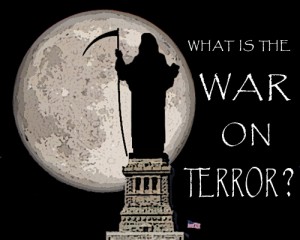 War on Poverty. War on Drugs. War on Terror. War on Christmas. Now there’s even a War on Women.
War on Poverty. War on Drugs. War on Terror. War on Christmas. Now there’s even a War on Women.
End the war!
Remember when “war” was a screaming horror that involved blood and grief and violent death? Human beings destroyed others like themselves with machine guns and tanks and mines and missiles. Real blood was spilled, real limbs were blown off bodies, and real wounds needed bandaging. Always it has been accompanied by atrocities. War is an awful thing, leaving a scar in a national history.
No more. Now war seems to have descended on the irrevocable downward path towards metaphor and then cliché. The use of the term is dishonest in intent. Often, it is a marketing tool for pre-packaged, manufactured outrage, and deserves an Orwell mention for its falsification of emotion for political ends. For the marketers who invent these buzzwords (or buzzphrases, in this case) it is a manipulative way to herd people into mobs, so that they will stampede to the ballot box, or tweet an avalanche of angry messages, or fill comment sections with group thinking and group emotions, or send emails to their congressmen and congresswomen, or call television advertisers and cancel subscriptions.
 Oddly, we’ve come to use other words for real wars. I’m old enough to remember when the Vietnam War wasn’t a war but a “police action.” We called it a war in retrospect – kind of like an economic depression, we’re only willing to look at it truthfully in a rear-view mirror.
Oddly, we’ve come to use other words for real wars. I’m old enough to remember when the Vietnam War wasn’t a war but a “police action.” We called it a war in retrospect – kind of like an economic depression, we’re only willing to look at it truthfully in a rear-view mirror.
Here’s my point: I think war is so terrible that the word should be reserved for the real thing. Maybe by keeping the word to take a snapshot of the unspeakable, we can help bring war itself to an end. At the very least we can reserve one, single word to accurately describe our greatest inhumanity. It’s a small step towards truth.
From Orwell:
“I have not here been considering the literary use of language, but merely language as an instrument for expressing and not for concealing or preventing thought … one ought to recognize that the present political chaos is connected with the decay of language, and that one can probably bring about some improvement by starting at the verbal end … Political language – and with variations this is true of all political parties, from Conservatives to Anarchists – is designed to make lies sound truthful and murder respectable, and to give an appearance of solidity to pure wind.”
You don’t have to be very old to remember that Susan Sontag launched a firestorm of attack when she suggested that young Islamic men, no matter how misguided, who drove airplanes into buildings could not reasonably be called “cowards,” as was the media fashion in the days following the terrible events of 9/11.
“
I remember a book she wrote long before that, Illness as Metaphor – apparently, it’s considered an “angry” book, but I did not read it with an angry voice in my head, and so it did not strike me so. She explored the use of the word “cancer,” and before it “consumption,” as a metaphor (isn’t there a “War on Cancer” somewhere, too?). A cancer victim herself, she wrote:
“I want to describe not what it’s really like to emigrate to the kingdom of the ill and to live there, but the punitive or sentimental fantasies concocted about that situation; not real geography but stereotypes of national character. My subject is not physical illness itself but the uses of illness as a figure or metaphor. My point is that illness is not a metaphor, and that the most truthful way of regarding illness—and the healthiest way of being ill—is one most purified of, most resistant to, metaphoric thinking. Yet it is hardly possible to take up one’s residence in the kingdom of the ill unprejudiced by the lurid metaphors with which it has been landscaped. It is toward an elucidation of those metaphors, and a liberation from them, that I dedicate this inquiry.”
 So it’s in her spirit I declare war on the word war. (We’ll take on “rape” as metaphor next.) And in case you somehow missed George Orwell‘s essay, “Politics and the English Language,” it’s here for free. A useful guidebook this election year.
So it’s in her spirit I declare war on the word war. (We’ll take on “rape” as metaphor next.) And in case you somehow missed George Orwell‘s essay, “Politics and the English Language,” it’s here for free. A useful guidebook this election year.
I’ll declare a ban on this one, too (Dare I say it? Dare I make the final step into political incorrectness?): The epithet “haters” is itself an expression of hatred by those who use it. Again: to call someone a “hater” is itself an act of hate. It is usually spat at someone or some group with contempt and a sense of one’s own superiority – it is never oneself who is a hater, only the “Other.” The use of the word is usually a political attempt to marginalize and enrage the target – with luck, bully him or her into shame and silence. However, I suspect I’m already a little behind the curve on this one – this insult has already passed its apex, perhaps having fulfilled its political usefulness.
Tags: "Susan Sontag", George Orwell


April 8th, 2012 at 8:06 pm
[…] The Book Haven calls for an end to Orwellian “wars.” […]
June 17th, 2013 at 5:58 pm
[…] [Stanford University] […]